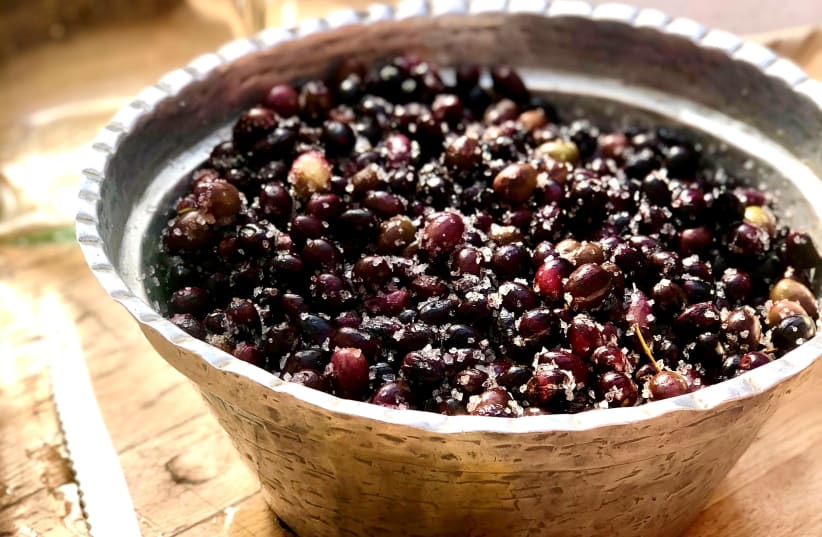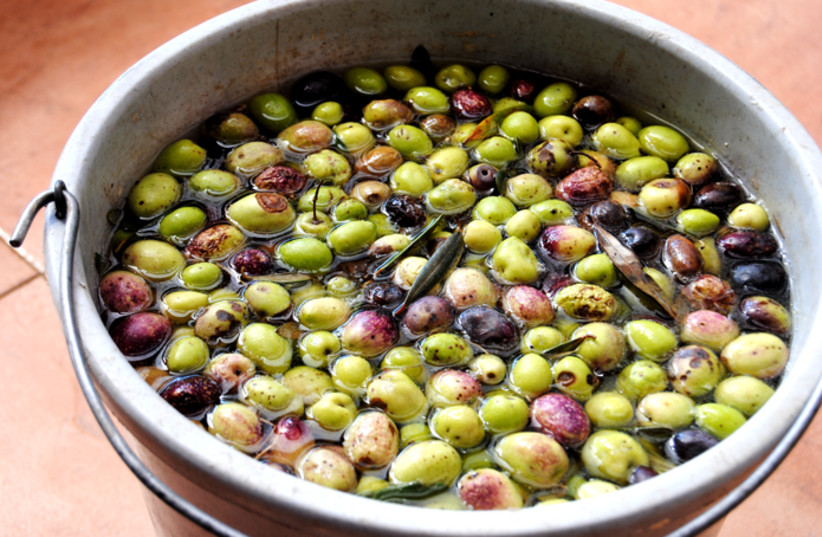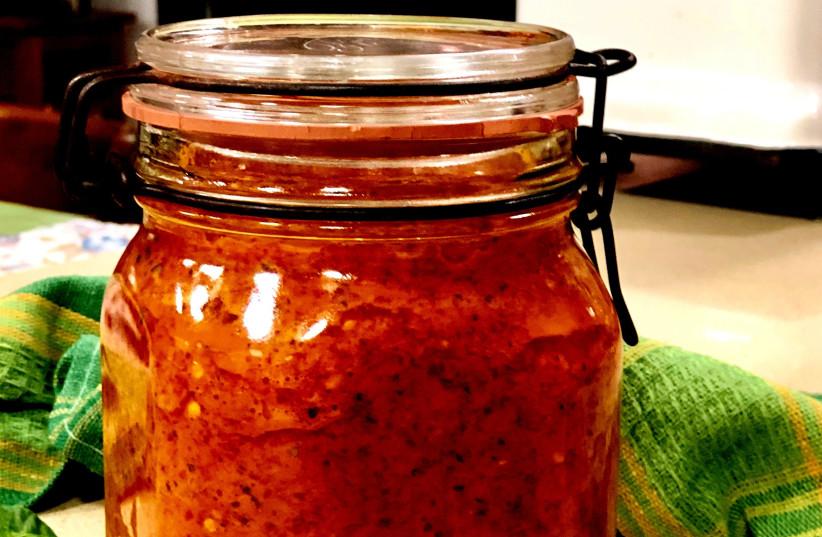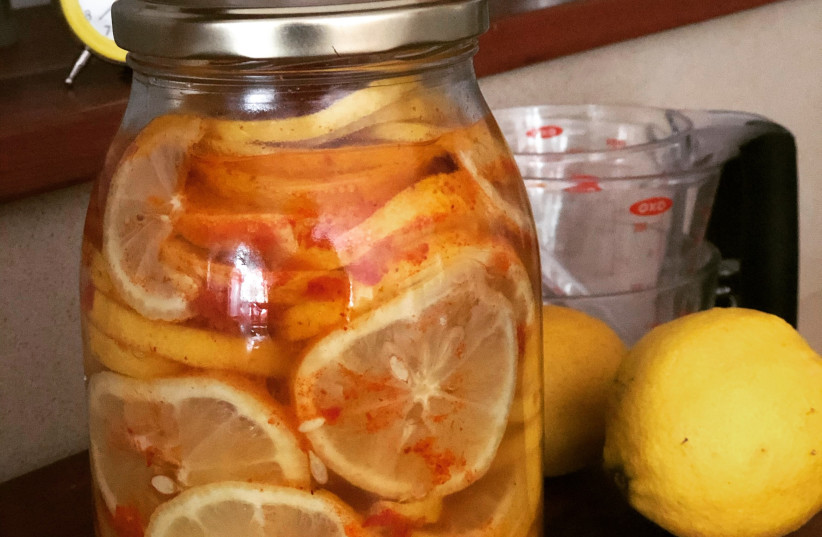The olive tree in my backyard did not, unfortunately, produce many olives this year. Luckily, I have lots of friends who supply me with delicious green and black olives every year in October and November when olives are ripe for harvesting, so I end up with plenty of jars of pickled olives.
When I’m ready to start, I roll up my sleeves and start the sorting process. Some olives get placed in a jar of water, while others get crushed or sliced up. The first thing I do is spread a large tablecloth on my large kitchen table, and spill out all the bucketloads of olives. I begin by sorting the olives by size. I remove all the bad olives and the leaves and any rocks. Next, I clean all the olives. Only then can I begin the process of separating the olives into different categories and deciding what to do with each batch.
Some olives are best used after they’ve been crushed with a mortar and pestle. Sometimes all you need to do is make a few slight cuts in an olive and it begins letting go of its bitterness, which intensifies the pickling process. Other olives are perfect, and so I leave them whole.
Homemade brine-cured olives are usually a little bitter, a taste that I’ve acquired over the years. Once you begin to get a feel for the ratio of water/salt/vinegar needed to pickle olives, the process becomes pretty simple. After you master this step, you can begin playing around with different herbs and spicy peppers to season the olives.
For example, all you need to pickle black olives is salt and a bit of lemon juice. After marinating them for two weeks, the black olives will have absorbed lots of flavor and also shrunken a little. They can be stored for a long time in a jar.
Unlike my olive tree, my lemon tree did produce lots of beautiful fruit this year, and so I took advantage of this to prepare multiple batches of pickled lemon slices. I added some herbs, closed the lids of the jars tightly and let them rest in my pantry for a week or two. Until you try it, you cannot imagine how much a spoonful of pickled lemons can add flavor to any dish you serve.
Another one of my successes this year was with habanero peppers, which I also grow in my home vegetable garden. I’ve never had so many habanero peppers before, so this year, I decided to use them to make an exciting and very spicy spread. I put on two pairs of latex disposable gloves to keep my hands safe, then I lobbed off the tops of the peppers, disposed of the seeds and rinsed them well. I dried them and only then did I grind them up together with some herbs. The spicy spread I ended up with came out an amazingly bright red color. You can play around with the ingredients, so you end up with the exact level of spiciness you want.
After preparing the jars of olives and lemon slices, I placed them on the windowsill in my kitchen, alongside the other vegetables I’m in the process of pickling. Every time I glance at them, my heart is filled with joy. There are small cucumbers sitting in a jar with dill and garlic cloves. Other jars have a variety of different colored peppers. I’ve prepared jars of dried tomatoes, that are stewing with coriander and oil, and jars of onions and turnips in vinegar. There’s a jar of peppers that I roasted and then placed in a jar with olive oil and salt, just waiting for the day when they will be eaten together with other delicacies. The best part about preparing all of these jars, is enjoying all this goodness throughout the entire year.
Pickled green olives
Makes 1 kg.
1 kg. of green olives1 lemon, sliced6 cloves of garlic, halved2 sprigs of rosemary½ cup salt¼ cup vinegar3 spicy chili peppers1 Tbsp. pepper
Soak the olives in water for 1 week. Change the water once a day. Drain.
Transfer the olives to a jar that can be closed airtight. Add all of the ingredients to the jar, and then add water to cover. If you want, you can add a layer of olives, then some herbs, then more olives, etc. Shake the jar well and store in a shaded place for two weeks.
Level of difficulty: Easy.
Time: 30 minutes.
Status: Parve.
Black olives
Makes 1 kg.
1 kg. black olives¾ cup cooking salt1 lemon1 Tbsp. coriander seeds½ cup oil
Soak the olives for 3 or 4 days. Change the water every day. Drain the olives and transfer the olives to a large bowl.
Add the salt and mix well. Cover with weights for a few days. Change the water every other day.
Transfer the olives to a jar that can be closed airtight. Add the lemon juice, coriander seeds and oil. Close well and store on a shelf for two weeks. For best results, shake the jar every once in a while.
Level of difficulty: Easy. Time: 15 minutes.Status: Parve.
Spicy habanero chili spread
Makes 1 jar.
200 gr. red habanero peppers3 large red bell peppers2 tomatoes5 sprigs of cilantro10 cloves of garlic1 Tbsp. salt4 Tbsp. olive oil
For storage: Olive oil
Grind all the ingredients with a food processor until smooth. Transfer to a jar and pour olive oil on top to cover spread. Close jar and store in the fridge.
Level of difficulty: Easy.
Time: 15 minutes.
Status: Parve.
Pickled lemons
Makes 2 liters.
1 kg. small Balady lemons1½ cups salt1 Tbsp. harissa or spicy paprika½ cup water
Slice lemons and place the slices in a large bowl.
In a separate bowl, mix the salt with the harissa, then add the water.
Transfer the lemon slices to a jar and pour the mixture on top. Close well and store in a shaded spot for 6 or 7 days.
Level of difficulty: Easy. Time: 15 minutes.Status: Parve.
Translated by Hannah Hochner.




